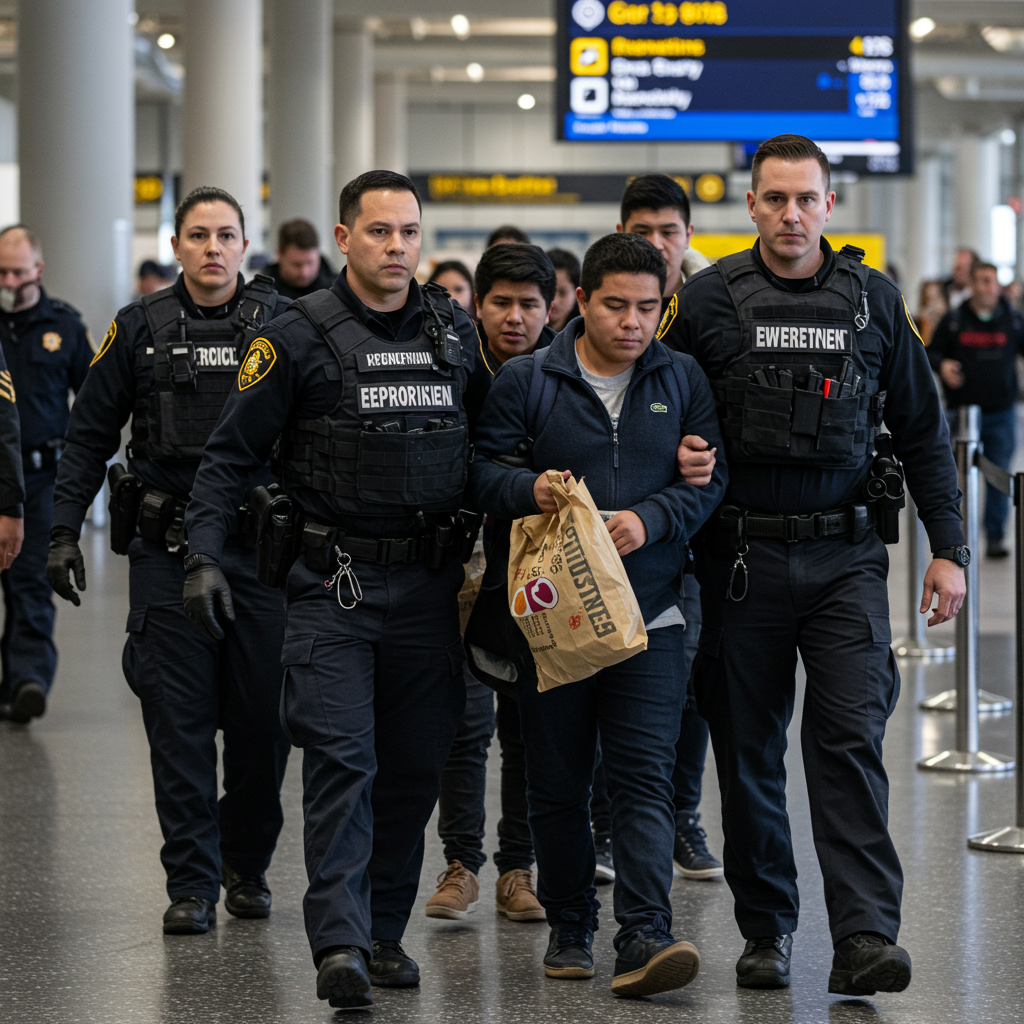In a significant development regarding immigration enforcement, eight non-U.S. citizens with extensive criminal records were deported to south Sudan on Independence Day, July 4th, 2025. The Department of Homeland Security (DHS) announced the successful removal, highlighting that it followed weeks of legal challenges they attributed to what they termed “activist judges.”
This deportation marks a notable outcome in the Trump administration’s efforts to accelerate the removal of individuals convicted of serious crimes, particularly to third countries when repatriation to their nation of origin is not feasible. The individuals had been held for weeks at a U.S. military base in Djibouti while legal battles played out in U.S. courts.
Background: The Legal Gauntlet
The path to deportation was fraught with legal challenges. Lower court rulings had temporarily blocked the administration’s plans to remove the eight individuals to a third country. These rulings raised concerns about due process and the potential dangers the deportees might face upon arrival in a nation like South Sudan, which carries a high-level travel advisory from the U.S. State Department due to crime, kidnapping, and armed conflict.
Specifically, U.S. District Judge Brian Murphy in Massachusetts had issued orders requiring the government to provide notice of the destination and allow individuals to contest removal based on fears of torture or persecution. He also mandated that the administration retain custody and control of individuals sent to third countries to ensure their safety.
However, the legal landscape shifted dramatically on July 3rd, 2025. The Supreme Court issued a ruling that overturned previous lower court injunctions. This decision cleared the way for the Trump administration to enforce its third-country removal policy and proceed with the planned deportation from Djibouti.
Crimes of the Deported
DHS provided details of the serious and violent criminal histories of the eight men. These were not minor offenses but convictions for grave crimes that posed direct threats to public safety within the United States. Only one of the eight men was a national of South Sudan; the others hailed from various countries in Latin America and Asia.
Among the deported were individuals convicted of:
Homicide: At least three individuals were convicted of murder (first or second degree) or homicide. One was serving a life sentence.
Violent Assault: Charges included attempted first-degree murder with a weapon and second-degree assault.
Robbery and Theft: Multiple convictions for armed robbery and larceny were listed.
Sexual Offenses: One individual was convicted of lascivious acts with a child under 12, and another for first-degree sexual assault involving a vulnerable victim.
- Other Serious Crimes: Kidnapping, impersonating a law enforcement officer, drug trafficking, multiple gun offenses, and driving under the influence convictions were also noted.
- www.foxnews.com
- www.newsweek.com
- www.aol.com
- www.aol.com
- www.pbs.org
Assistant Secretary Tricia McLaughlin emphasized that these cases transcended typical immigration enforcement. She stated these individuals represented significant threats to American communities, asserting that judges had attempted to force their return to the U.S.
Official Response and Justification
Following the deportation, DHS celebrated the outcome as a victory for public safety and the rule of law. The agency credited the Supreme Court’s intervention for resolving the legal “logjam” that had prevented the removal.
McLaughlin publicly criticized the prior court delays, arguing they had put ICE officers “stranded and at risk” during the weeks the men were held in Djibouti. She described the deported individuals in stark terms, calling them “sickos” and “barbaric criminal illegal aliens” whose actions were so “heinous even their own countries will not accept them.”
The administration framed the successful deportation as a direct result of its commitment to enforcing immigration laws and protecting American citizens from dangerous individuals. President Trump also weighed in on social media, praising the ICE officers and referencing the deportation operation as part of broader efforts to control immigration and enhance national security.
Concerns and Criticisms
Despite the administration’s portrayal of the event as a necessary action, the deportation faced significant criticism and raised human rights concerns from legal advocates and some judicial figures.
Lawyers representing the deportees argued that sending them to South Sudan, a country the U.S. State Department advises against traveling to due to extreme risks, amounted to “punitive banishment” and placed them in likely danger of arbitrary imprisonment, torture, or death. The U.S. government itself grants Temporary Protected Status (TPS) to South Sudanese nationals already in the U.S. due to the unsafe conditions in their home country.
Judge Randolph Moss, who briefly heard the case in the D.C. District Court, also voiced concerns about the safety risks. He questioned whether the U.S. government could legally send individuals to circumstances where their physical well-being was clearly jeopardized, regardless of whether it was intended as punishment or deterrence.
Dissenting justices on the Supreme Court also expressed alarm. Justice Sonia Sotomayor, joined by Justice Ketanji Brown Jackson, argued that the majority’s decision allowed the administration to pursue “unlawful ends” and expressed serious concern that the non-citizens, whom she described as having been “illegally removed,” would be handed over to South Sudanese authorities without adequate consideration for the high risk of torture or death. The Justice Department, conversely, claimed to have received “credible diplomatic assurances” from South Sudan regarding the migrants’ safety.
Implications for Third-Country Deportations
This case sets a significant precedent for the Trump administration’s strategy of deporting non-citizens to third countries with which the U.S. has agreements, even if those individuals are not citizens of that destination country.
The Supreme Court’s ruling appears to broaden the administration’s authority in these removals, potentially diminishing the ability of lower courts to block such deportations based on general safety concerns or due process arguments regarding the destination country.
The holding of the men in Djibouti highlights the logistical and legal challenges faced when a deportee’s home country refuses to accept them. It signals the administration’s willingness to utilize offshore locations and rapidly engage the Supreme Court via the “shadow docket” to overcome judicial obstacles to its immigration policies.
This specific deportation underscores the administration’s focus on removing individuals with criminal convictions, regardless of their national origin or the human rights situation in the receiving country, so long as a third-country agreement is in place and upheld by the highest court.
Frequently Asked Questions
Why were these criminal immigrants deported to South Sudan when most were from other nations?
Only one of the eight deported individuals was a national of South Sudan. They were sent there as part of the U.S. government’s third-country removal policy. This policy allows for deporting individuals to nations other than their home country, often because their country of origin refuses to accept them or due to existing agreements the U.S. has with the third country, such as South Sudan in this specific instance.
What role did the Supreme Court and lower courts play in delaying these deportations?
The deportation was initially delayed by lower court rulings, particularly from U.S. District Judge Brian Murphy. These rulings aimed to ensure due process and address safety concerns regarding deportation to a dangerous third country like South Sudan. The Supreme Court intervened on July 3rd, 2025, overturning these lower court injunctions and clearing the legal path for the Trump administration to proceed with the deportation, ending the perceived “delays” by what DHS termed “activist judges.”
What safety or human rights concerns were raised about deporting individuals to South Sudan in this case?
Significant concerns were raised about the safety of the deportees in South Sudan, a country with a high-level U.S. State Department travel warning due to crime, conflict, and human rights issues including arbitrary killings and torture. Lawyers and dissenting Supreme Court justices expressed fears that the deported individuals would face violence, torture, or death upon arrival. The U.S. government claimed it received credible assurances from South Sudan regarding the individuals’ treatment, but these assurances were disputed by critics.
Conclusion
The deportation of eight criminal non-citizens to South Sudan on Independence Day, following rapid legal maneuvers culminating in a Supreme Court decision, represents a significant moment in U.S. immigration enforcement under the Trump administration. It underscores the administration’s priority on removing individuals with criminal records and its willingness to leverage third-country agreements and the highest courts to overcome judicial resistance. While framed by DHS as a victory for public safety and the rule of law after delays by “activist judges,” the case also highlights deep-seated concerns about due process and the humanitarian implications of deporting individuals to nations with precarious security and human rights records, raising questions about the balance between national security interests and international human rights standards. The outcome sets a precedent that may influence future deportations to third countries.



